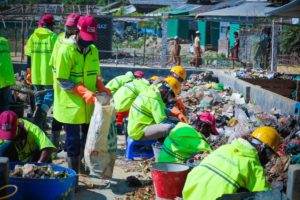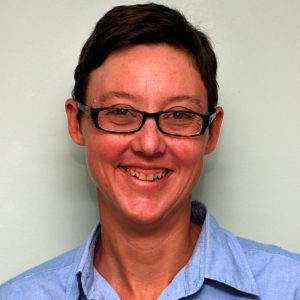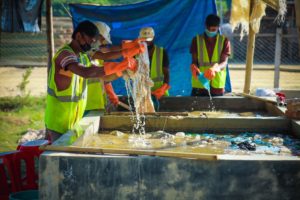A new project could solve one of the world’s toughest problems by using cutting edge technology to collect plastic from polluted waterways and recycle it.
Practical Action staff launched the scheme in Bangladesh this month (July 2021) with a mission to reduce the amount of plastic waste in the local environment and oceans.
At the same time, they will employ their experience of working with low-wage rubbish collectors to ensure they benefit via the creation of new jobs, improved working conditions and higher wages in Faridpur and other urban areas.
benefit via the creation of new jobs, improved working conditions and higher wages in Faridpur and other urban areas.
The project was designed with River Recycle, environmental clean-up company Lamor, Society Development Committee, a Faridpur based community organisation and the Danish Department for international development, Danida.
It will use cutting edge technology to collect and process low-grade plastic from the most polluted parts of the Padma River and in landfill sites, market places and from households.
State-of-the-art pyrolysis processes will be used to turn waste into a clean high-grade oil, which can be used for transportation. Low grade plastic from rivers is one of the biggest contributors to plastic pollution in seas. This project is intended to be a pilot, from which similar initiatives can be developed in the world’s most polluted rivers.
 Practical Action interim CEO Sarah Roberts said: “This exciting project takes a circular economy approach to keeping plastics out of our oceans and improving the livelihoods of waste workers.
Practical Action interim CEO Sarah Roberts said: “This exciting project takes a circular economy approach to keeping plastics out of our oceans and improving the livelihoods of waste workers.
“The strength of the partnership means that we can test an innovative approach and new business model with the aim of not only embedding it in Bangladesh but adapting it for other cities with heavily polluted rivers around the world.
“Not only will we develop a second use for single use plastics, keeping them out of waterways, we will create cleaner slum and low-income areas in cities and dignified work that pays a decent wage to people who don’t have that right now.
“Our approach of putting communities at the centre of all our work means that we gain buy-in from all sections of society. “In doing so, we can create sustainable change that has the potential to take this solution to scale.”
The project will include a partnership between Practical Action and the local and international private sector, which places them as an integral part of the project delivery, working with our staff to develop and deliver vital services.
Other crucial partners will include local authorities in Faridpur, who will provide land for establishing the plant plus  other local and legal support, as well as the Bangladeshi Government ministries of Labour, the Environment, Energy, Mineral Resources and Local Government and Rural Development.
other local and legal support, as well as the Bangladeshi Government ministries of Labour, the Environment, Energy, Mineral Resources and Local Government and Rural Development.
River Recycle has a mission to prevent plastic waste entering the ocean and to ensure there is a circular economy approach which also delivers social benefits to local waste workers.
Practical Action has a long history of working at a grassroots level with informal waste and sanitation workers in Bangladesh and together they have been influential in changing systems and laws in the country to make urban areas more fit for human habitation. The Lamor Foundation has a wealth of experience using innovation and new technology to clean up oceans and rivers through waste management, water treatment and by responding to oil spills.